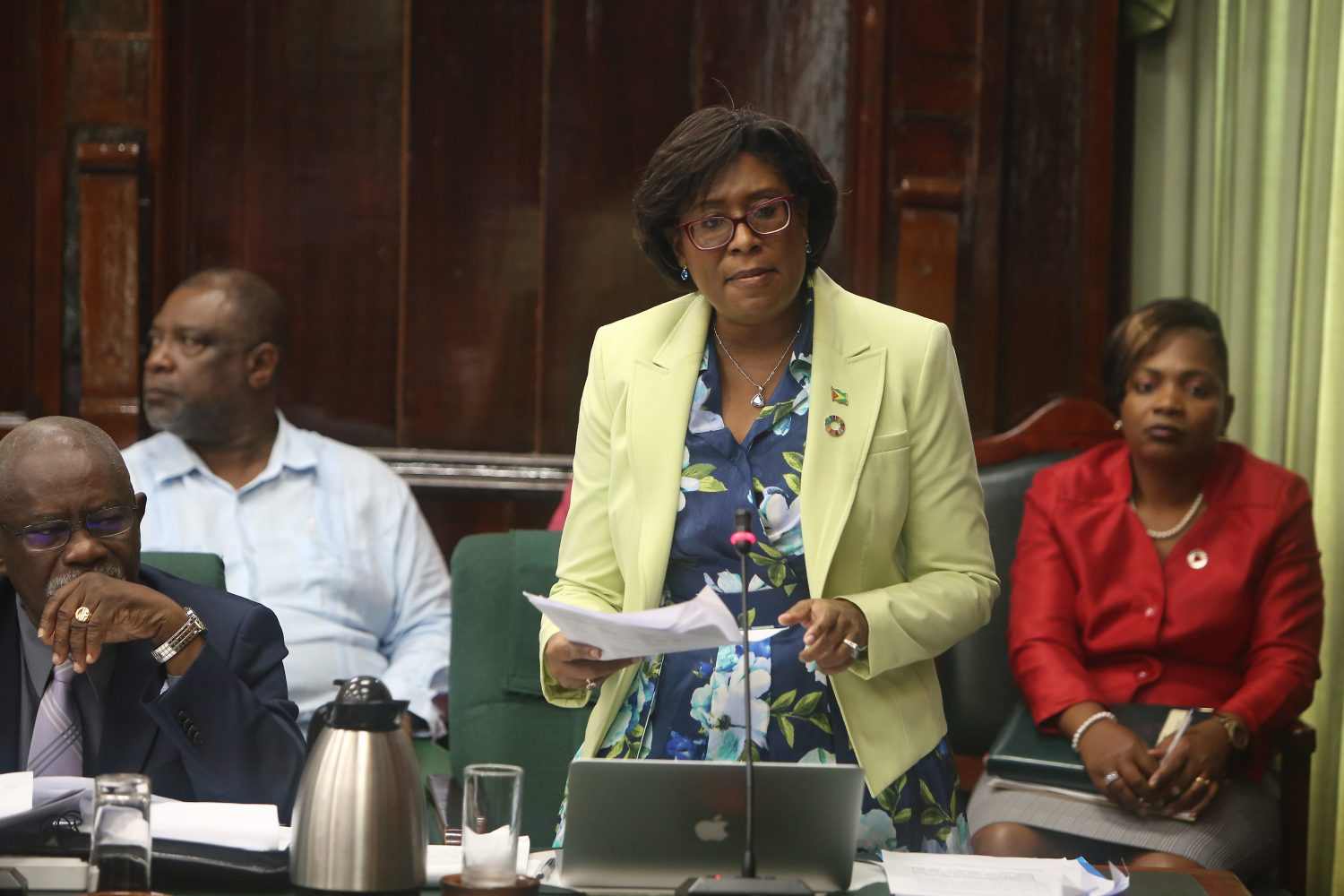Minister of Public Telecommunications Cathy Hughes on Tuesday said the 2018 budget is offering Guyanese a “taste of a good life” and stressed that her administration has been picking up the pieces left by the former administration but the process is taking longer than anticipated.
During her contribution to the debate on the 2018 national budget, Hughes noted the strides by the government in the area of Information Communication Technology (ICT), saying it is setting up young citizens to play active roles in their own lives, and in the development of the country’s emerging industries.
She noted that based on a very detailed survey that was completed in 2016, her ministry designed a five-year project to take the internet and the government’s e-services to the hinterland and poor and remote communities. The US$17 million project is funded by the Guyana REDD+ Investment Fund (GRIF) and will be managed by the United Nations Development Programme (UNDP). It is expected that as a result of it, over 89,000 residents in some 170 communities will have access to more than 200 ICT hubs to be created over the period and access to online public e-services, such as filing tax returns and applying for business compliance certificates.
Hughes also noted that in 2017, the ministry completed the restructuring of the National Data Management Authority (NDMA) and merged it with the executing arm of the ministry. This enabled the ministry to satisfy government’s commitment to improve the delivery of public services as well as citizen-to-government interaction.
According to the minister, the NDMA has also worked closely with communities and villages in regions 2, 3, 4, 5, 6, 9 and 10 and has set up 86 ICT hubs with computers donated by government thus, providing nearly 200,000 citizens with internet access.
‘Picking up the pieces’
Hughes also sought to debunk criticisms by PPP/C parliamentarian Gillian Burton-Persaud of the government’s ICT developments in the hinterland. Hughes called Burton-Persaud’s criticisms a travesty, while noting that the government pays a premium price to connect the regions, while the PPP/C’s commitment was to installing a fibre optic cable but instead of connectivity one billion dollars went down the drain. “Nothing but damaged cable to show. Where did the billion dollars go? And you talk about corruption,” Hughes said. “Mr Speaker now they shout in the usual abusive way – you’re in power now, fix it… yes, we are fixing it. We are going across the country, across all sectors… picking up the pieces and fixing it. It is taking longer than we thought, but we will fix it,” she affirmed.
Responding to Burton-Persaud’s claim that ICT development has been marking time, Hughes pointed out that the fibre optic network was completed in 2012 under the PPP government but lay dormant or dead for three years until her government came along and made it operational in 2015.
Hughes also sought to debunk what she dubbed “fake news” spread by PPP/C parliamentarian Pauline Sukhai, who said the budget had nothing to bridge the gap between the hinterland and the coast. Hughes said that her government is committed to the indigenous population and has provided sustainable internet access to several villages to allow residents to sell their products, participate online and learn and grow.
She added that some $50 million has been allocated in the budget for improved solar solutions in the ICT hubs; $15 million to procure more fibre optic cable; $16M for more internet access points; and $20 million for power redundancy at the data centre.
According to the minister, several young entrepreneurs have emerged as a result of the enabling programmes developed by her ministry and their will to succeed. She said the ministry continues to work with the young entrepreneurs, helping them to bring their products to market and eventual monetisation.
Projections
In 2018, Hughes said a three-year national broadband project is proposed at an estimated cost of US$37.6 million and this is expected to upgrade the e-government network to enable equitable delivery of services to citizens in the areas of education, health, security, government administration, business, citizenship and immigration. A loan has been submitted to the China EXIM bank and approval is being awaited.
She added that there will also be a national ICT strategy, which is a 10-year strategy based on two fundamental pillars: the growth of ICT as an independent sector and its application as a cross-cutting component in all other sectors.
It is expected that next year will also see human capital development, the thrust of which is to develop a knowledge-driven, e-ready population, with a focus on the people in rural and hinterland areas who are usually left out. There will also be an outreach for ICT skills development, ICT training, animation and game design and this will see the ministry seeking out an animation expert to create the curriculum to train local IT instructors in the growing field. These trainers will be expected to be able to enlarge the animation production group that already exists, and ultimately enable Guyana to offer candidates for CXC’s animation and game design subject at the Caribbean Advanced Proficiency Examination level.





